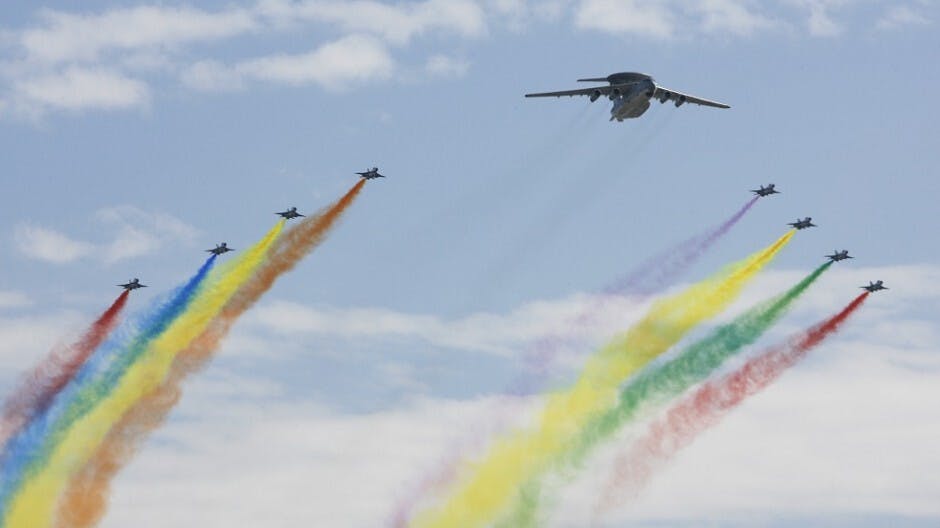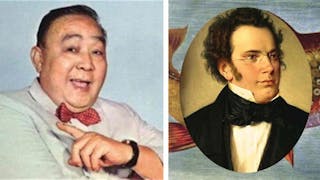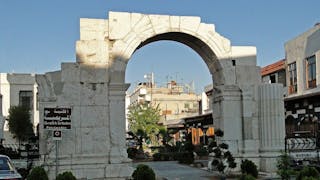中國詩人徐志摩1931年死於飛機失事,1926年他寫過一篇傳頌一時的散文《想飛》,文中說:「是人沒有不想飛的。老是在這地面上爬着夠多厭煩,不說別的。飛出這圈子,飛出這圈子!到雲端裏去,到雲端裏去! 這才是做人的趣味!」
衝上雲霄,翱翔萬里,振翅高飛,壯志逍遙。
英語飛翔的方式,也有不同的說法。Flying in various ways: to fly(飛行);to soar(翱翔,高飛);to glide(滑翔); to float(飄蕩);to hover(盤旋);to skim(輕輕掠過);to swoop(俯衝,猛力下降)。
Flying high means having a lot of success(非常成功): The company was flying high as a maker of personal computers. 類似的說法是 with flying colours(大獲全勝):Peter passed his English test with flying colours; get off to a flying start = to begin an activity very successfully: Paul got off to a flying start in his new job.
What you do at the airport:
1. When you arrive at the airport, you go into the terminal building(客運大樓).
2. You check in for your flight at the check-in desk(登機手續台).
3. You show your passport at the passport control(護照檢查卡)and then go through security(通過安檢), where they check that you are not carrying any weapons.
4. If you have time you can wait for your flight in the departure lounge(候機室).
5. When your flight is called, you go through the departure gate(登機入閘)in order to get onto the plane.
6. The plane then takes off from the runway(跑道).
7. After your plane has landed, you go to the baggage reclaim(提取行李處)to collect your luggage, then go through customs(海關)and immigration(移民局檢查站), where they check your passport and your bags. You then go out into the arrivals area of the airport.
以 Fly 作為動詞的成語,不一定和飛行有關,但常有快速、迅捷、一觸即發等意思, 例如:time flies = time seems to pass very quickly(光陰似箭,日月如梭);to fly into(突然迸發);to fly off at a tangent = digress(突然離開話題,扯到題外,背離原本思路,轉到其他方面);to fly off the handle = burst into anger(大發脾氣,勃然大怒);fly in the face of = vigorously oppose(公然違抗,全然不顧)。
Fly 作為名詞,可解作蒼蠅,成語有:like flies = in large numbers(大量地,大批地);wouldn’t hurt a fly = very gentle(心地善良,連一隻蒼蠅都不肯傷害);fly on the wall = eavesdropper(偷聽者,不為人察覺的觀察者);fly in an ointment = the only thing that spoils something and prevents it from being successful(美中不足之處)。
飛機(airplane; aeroplane in British English)常見的不同類型有:airliner/a large passenger plane(大型客機);cargo plane(貨機);jet liner(噴射客機);glider(滑翔機);chopper/helicopter(直升機);Airbus(空中巴士)等。
在飛機上工作或與飛行工作有關的人有(people working on and with aeroplanes):air crew(空勤人員);ground crew(地勤人員);cabin staff(客機服務員);pilot(飛機駕駛員);co-pilot(副駕駛員);navigator(領航員);captain(機長);aviator(駕駛員);astronaut(太空人,航天員);steward(客機上的服務員);air hostess(空中小姐)。
飛行旅程的常見配詞(Collocations of flight):
You catch a flight/miss a flight.
Flights are called/delayed/diverted/cancelled.
You get a short flight/domestic fight/international flight/regular flight/scheduled flight.
You may choose a direct flight or a connecting flight.
Flights can be bumpy or smooth.
Many people suffer from jet-lag after long flights.
馬航客機 Flight MH370 失事,原因眾說紛紜。空難初期,《波士頓環球報》(Boston Globe)有文章說:出事原因有九個不同理論(Missing Malaysia Airlines Flight has 9 potentially legitimate theories):
1. Pilot Suicide 機師自殺
2. Pilot Sabotage 機師蓄意破壞
3. Hijacking by Terrorists 恐怖分子劫機
4. Pilot Error 機長失誤
5. Meteor 流星撞機
6. Weather 天氣惡劣
7. Mechanical Failure 機械故障
8. Catastrophic Failure 災難性失誤
9. Decompression 氣壓特減效應
當中最耐人尋味的是飛機上的通訊器和外界突然失去聯絡。A distress signal(飛機遇難的求救信號)is a signal sent out in a situation when a plane is in danger or difficulty and needs help. Mayday(國際通用無線電通話的遇難求救訊號。源自法語:速來救助!)is an emergency procedure word used internationally as a distress signal in voice procedure radio communications. A May-day call is the international radio signal used by an aircraft needing help when its flight is in danger. 馬航空難事件最備受關注的:flight transponder(飛機上的應答器或轉發器)is a piece of equipment that receives radio signals and automatically sends out another signal in reply。
本專欄逢周二、五刊登





































